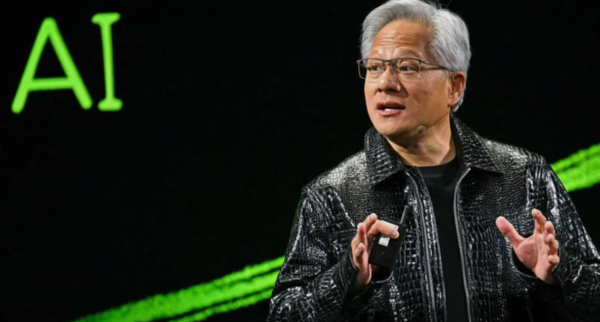Nvidia, a top computer chip maker, is growing fast thanks to the rise of artificial intelligence (AI). Big tech companies want more of its chips to power their AI projects, even though the firm faces political challenges between the US and China.
On Wednesday, Nvidia said it made $46.7 billion (£34.6bn) in the last three months, up 56% from the same time in 2024. But its shares still fell in after-hours trading because of worries about US-China trade rules.
The company has had to deal with shifting US government policies meant to keep America ahead in AI.
Nvidia’s role in the AI boom
Nvidia’s powerful chips are driving today’s AI race. Its biggest customers include Meta (owner of Instagram) and OpenAI (maker of ChatGPT). Boss Jensen Huang said spending from four major tech firms had doubled to $600bn a year. He also said AI will help speed up global economic growth, with Nvidia providing much of the needed technology.
Analysts say Nvidia has little competition in AI chips and is key to the current boom. Most of its money now comes from data centers, where revenue jumped 56% to $41.1bn, though this was slightly below forecasts.
Some investors warned that Nvidia’s rapid rise might look like a bubble, but others pointed out its “unbelievable” growth. In July, Nvidia became the first company worth $4 trillion.
For the next quarter, Nvidia expects revenue to rise further, possibly reaching $54bn, above Wall Street’s predictions.
Geopolitical challenges
Despite its success, Nvidia remains caught in US-China tensions. Earlier this year, it resumed sales of special AI chips to China after lobbying the US government to lift a ban. The US had worried these chips could help China’s military.
Now, the US is reviewing licenses for sales of Nvidia’s H20 chips in China, though none have been shipped yet. The government also plans to take 15% of revenue from approved H20 sales. Nvidia has not counted these sales in its forecasts and is also pushing for approval to sell its newer Blackwell chips to China.
Meanwhile, China is working hard to build its own chip industry. Analysts warn that US export limits may speed up Chinese competition. Some also say Nvidia’s move into robotics could be key to keeping its lead in the AI economy.
Also Read:
Microsoft’s Brad Smith Calls Security Failures ‘Not Acceptable’
